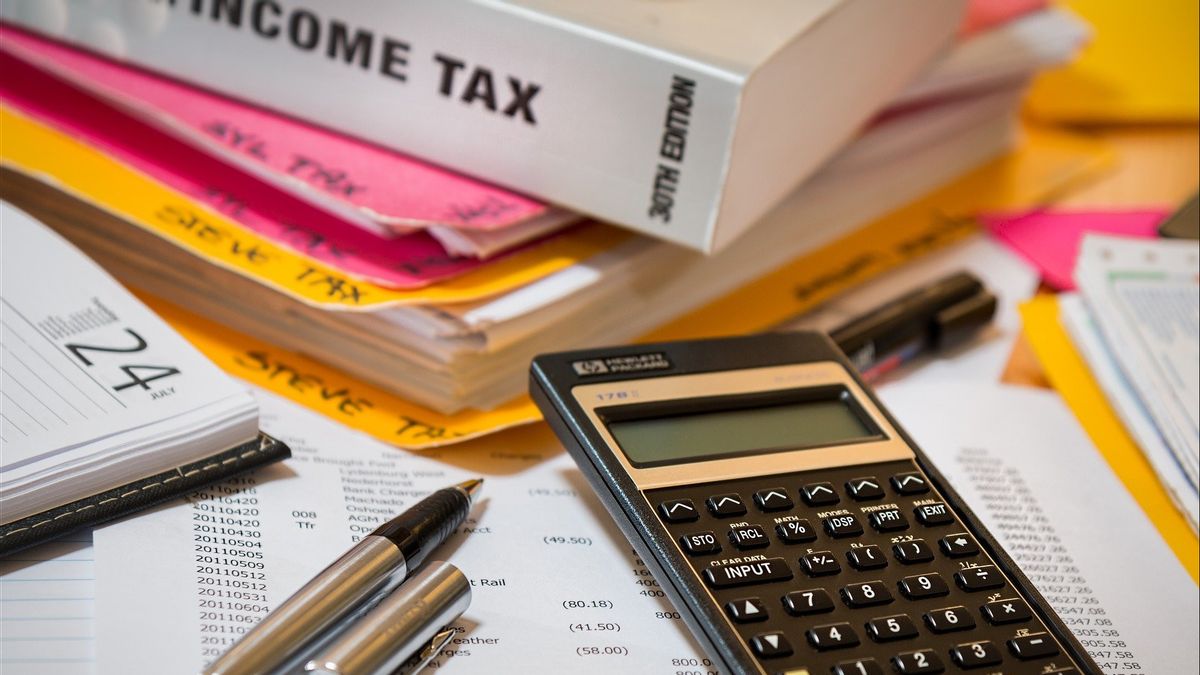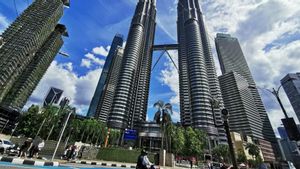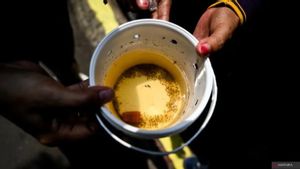JAKARTA - The government plans to tax basic food products next year through a Value Added Tax (VAT) of 12 percent. However, at this time, food items are not taxable.
This plan is contained in the revision of the Draft Law (RUU) Number 6 of 1983 concerning General Provisions and Tax Procedures (KUP).
In Article 4A of the Draft KUP Bill, the government removes several types of goods that are not subject to VAT, including basic necessities that are very much needed by the people. This means that groceries will be subject to VAT.
The basic food items regulated in the Minister of Finance Regulation number 116/PMK.010/2017 include rice and unhulled rice; corn; sago; soy; consumption salt; meat; egg; milk; fruits; vegetables; sweet potatoes; spices; and sugar consumption.
This plan is certainly troubling many poor people. This is because the price of goods is getting more expensive and it will be more difficult to buy because of low income, especially during the COVID-19 pandemic, many have lost their source of income.
Ironically, the government has actually provided a number of tax incentives since last year and is still ongoing today. This is to help business entities stay afloat with their business amidst the pressures of the COVID-19 pandemic.
The latest given is incentives for the automotive sector. The government provides tax discounts of up to 100 percent or sales tax on luxury goods (PPnBM) starting at 0 percent for the purchase of new cars.
It is known, cars with a cylinder capacity of up to 1,500 cc and a domestic component level of at least 70 percent can get this tax discount. This incentive is divided into three stages of 0 percent PPnBM March-May, 50 percent PPnBM June-August and 25 percent PPnBM September-December.
This incentive has succeeded in making the upper middle class flock to buy new cars. This is reflected in the rapid increase in domestic car sales and production in the first quarter of 2021.
In the midst of the incentives given to the 'rich people', it is sad that the poor will be even more miserable. How not, the basic necessities or basic necessities that are needed are getting more expensive because they will be subject to tax rates.
Parliament CriticizesDeputy Speaker of the Indonesian House of Representatives Abdul Muhaimin Iskandar (AMI) asked the government to review the plan for imposing Value Added Tax (VAT) for basic goods (sembako) which was rolled out during the current pandemic.
"It needs to be reviewed. The current economic situation is difficult," said Muhaimin, Friday, June 11.
According to the man who is familiarly called Gus Ami, this policy plan has the potential to make people's lives more difficult.
On the other hand, he added, the government has just issued a zero percent VAT policy for imported vehicles and property to stimulate the economy. So that the sector's businesses can bounce back so that the purchasing power of consumers increases.
"This is counterproductive to the government's efforts to suppress inequality through tax reform in the revision of the KUP Law," said the general chairman of the PKB.
In addition, he continued, market traders are experiencing difficulties because more than 50 percent of their trade turnover has decreased during this one-year pandemic.
"If the basic needs are removed from the group of types of goods that are not subject to VAT, of course it will harm the community because basic necessities are needed by the community," explained Gus Ami.
Member of Commission X DPR RI Gerindra Party faction Himmatul Aliyah firmly rejected the government's plan because every citizen is guaranteed the right to get an education. Moreover, the government is also mandated to pay for the education of its citizens.
"This is clearly stated in Article 31 of the 1945 Constitution," said Himmatul to reporters, Friday, June 11.
According to him, this plan is very unethical as well as unconstitutional. Because now people are actually charged with tax obligations where the government should be the one who has to pay for the education of its citizens.
"So, if the plan is implemented and the law is passed, it will be vulnerable to being sued in the Constitutional Court," said the Gerindra politician.
Meanwhile, the Deputy Chair of the MPR RI from the PPP faction, Arsul Sani, questioned the government's discourse to apply tax rates for basic needs and education. The reason is that the discourse has the potential to violate the 5th principle of Pancasila, namely Social Justice for All Indonesian People.
According to him, the constitutionality of this policy will open up problems if it is actually included in the KUP (General Tax Provisions) Law.
"This policy is open to being challenged with arguments that contradict Article 33 paragraph 4 of the 1945 Constitution of the Republic of Indonesia, particularly related to the principles of togetherness, efficiency with justice and maintaining the balance of national economic unity," Arsul told reporters, Thursday, June 10.
The chairman of the DPR's PPP faction reminded that some time ago the government had relaxed its tax policy by minimizing the imposition of value added tax on luxury goods (PPN-BM) on certain categories of cars.
"In fact, there are only some Indonesians who will benefit from this policy, especially those with upper middle class status, who have the ability and purchasing power for cars that get VAT-BM relief. This means that the government is willing to lose one of its sources of fiscal income," he explained. Arsul.
However, according to the member of Commission III of the DPR, if to cover the loss of fiscal resources, the Government replaces it by increasing the tax burden on basic goods that are the livelihood of all people, then the 'social justice' side for all Indonesian people should be questioned.
Meanwhile, in terms of the constitution, added Arsul, the policy of providing VAT relief in certain sectors that are not the interests of all the people, then replacing the loss of fiscal resources by imposing VAT on sectors that actually intersect with the interests of all the people can be seen as contrary to constitutional norms.
In line with that, the Chairman of the DPD RI La Nyalla Mahmud Mattalitti assessed that the draft Revision of Law No. 6 of 1983 concerning General Provisions and Tax Procedures (KUP) which regulates taxes on education services and basic necessities is contrary to a sense of justice.
The reason is on the other hand, the government also provides property tax incentives for buying ready stock houses and a number of other tax incentives. Including the discourse of tax amnesty or tax amnesty.
"If taxes for schools, health services and basic necessities are imposed at a time when the government provides many facilities for the upper class, it will be against the sense of justice," said La Nyalla, Friday, June 11.
According to him, the government must pay attention to the views of economists who state that the discourse will widen the gap between the rich and the poor.
Therefore, he reminded that the plan to give taxes to a number of sectors that intersect with the interests of small communities must be reviewed.
"The rules for providing taxes for the education and basic food sectors should be reviewed. I think this policy is not appropriate because it will burden the small community," said the senator from East Java.
The Impact of VAT on Food and EducationSociologist expert from the National University, Sigit Rohadi said that the application of VAT in the education sector to basic needs can have a social impact on the community.
Initially Sigit explained the direct impact that could happen to the community if basic commodities were subject to VAT.
"If it is implemented, the imposition of taxes is really carried out, of course it will burden the lower class, people who have been enjoying or consuming goods, say basic necessities with mediocre income," said Sigit, Friday, June 11.
Sigit then revealed the fact that people who are in the poverty line and fall below the poverty line spend 60-70 percent of their income on basic needs. Thus, if taxes are imposed on these basic commodities, the quality of life of the community will decrease.
"If basic necessities are subject to taxation, of course, spending on basic needs will be multiplied so that they will not be able to meet the needs of secondary or tertiary goods. If this (tax) is properly implemented, it is certain that the quality of life of the lower-class people will decrease," The poverty rate will increase faster than the previous period," he said.
In addition, there is a social impact on the education sector if the discourse of VAT on education is also implemented by the government. He revealed that the condition of students with lower-middle families would be even more squeezed if it was actually implemented.
"Thus, children whose people have lower middle income only get less competitive schools and private schools. If schools are also taxed, then they get hit 2 or 3 times as much for spending, this should be seriously considered by policy makers at the Ministry of Finance," he said.
Sigit also said that there will be a long-lasting impact if the government is serious about implementing tax policies on basic needs. According to him, crime will increase because people who have difficulty will tend to find the easiest way to meet their needs.
"If it is prolonged, of course, crime will increase, because the increase, or the use of income, or mediocre income used to meet basic needs, will make people look for easier ways to meet their needs," he explained.
"Well, especially in this pandemic era, the unemployment rate, the number of layoffs or layoffs is also high, around 5 million people are laid off. Now if this happens, of course, competition to get goods is very high, that means crime will also increase," he continued.
Sigit also asked the government to reconsider the imposition of taxes for the education sector and basic needs. He considered that the government should impose a tax on goods of secondary and tertiary needs.
"It should be considered, rethinking to impose a tax on basic necessities related to basic necessities. Taxes should be imposed on secondary goods, luxury goods, rather than increasing basic needs, it is better to increase taxes on restaurants, hotel taxes, then taxes Vehicles that are clearly consumed by the upper middle class are more appropriate," he said.
Meanwhile, CORE Senior Economist Piter Abdullah said that in this condition the Government should not increase or add VAT-subjected goods, especially primary necessities, namely basic necessities.
The government should continue to focus on providing assistance to the poor and not just make it more burdensome.
In addition to making the poor suffer more, this is also considered to have an impact on the process of economic recovery that is currently underway.
"I think the government needs to reconsider this plan," he said.
Food and Education VAT Not Enforced This YearThe Ministry of Finance emphasized that the government will not collect Value Added Tax (PPN) for basic necessities and schools this year.
Special Staff to the Minister of Finance, Yustinus Prastowo, said the government is currently focusing on restoring the national economy due to the COVID-19 pandemic.
"So it is not true that there will be taxes in the near future, taxes on basic necessities, education services, health, tomorrow, or next month, this year they will be taxed. No," said Yustinus in a webinar, Friday, June 11.
Yustinus said that at this time the government had not discussed the revision of the Fifth Law Number 6 of 1983 concerning General Provisions and Tax Procedures (RUU KUP) regarding the tax on basic necessities and education services with the DPR.
Even though the policy framework already exists, the discourse on increasing VAT for basic necessities and some other goods/services is not immediately discussed because it has not been discussed in the plenary session.
The emergence of the new policy framework is because the government and the DPR have agreed to discuss the KUP Bill in the near future. The plan for imposing VAT for basic necessities to education itself has actually been discussed for a long time.
"The bill is still under the leadership of the DPR, it has not even been finalized and has not been discussed. We are still listening to the aspirations of many parties," said the Minister of Finance Stafsus.
The English, Chinese, Japanese, Arabic, and French versions are automatically generated by the AI. So there may still be inaccuracies in translating, please always see Indonesian as our main language. (system supported by DigitalSiber.id)








